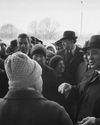
Mikhail Gorbachev
Born March 2, 1931
The rises and falls of the esteem in which Russians have held Mikhail Gorbachev over the years have been dizzying. As for the falls, Alexander Kerensky, head of the 1917 Provisional Government after the February Revolution, may be the only other figure in Russian history to experience a more precipitous plummet from wild adoration to bitter contempt.
The first reaction to Gorbachev was probably surprise. No – that’s too weak a word. In the spring of 1985, the Soviet people were utterly baffled, dumbfounded, and stunned: some were pleasantly amazed; others were absolutely appalled. Before the Politburo elected him to head the Communist Party in March 1985, no one had ever heard of Mikhail Sergeyevich Gorbachev, or at least no one who didn’t follow the party’s inner workings (a rare breed).
This story is from the March/April 2021 edition of Russian Life.
Start your 7-day Magzter GOLD free trial to access thousands of curated premium stories, and 8,500+ magazines and newspapers.
Already a subscriber ? Sign In
This story is from the March/April 2021 edition of Russian Life.
Start your 7-day Magzter GOLD free trial to access thousands of curated premium stories, and 8,500+ magazines and newspapers.
Already a subscriber? Sign In

Sidewalk Art
The lamentable state of Russia’s roads and sidewalks has long been fertile ground for memes and jokes. Irkutsk artist Ivan Kravchenko decided to turn the problem into an art project. For over two years he has been patching ruts in city sidewalks with colorful ceramic tiles.

Sputnik V: First Place or Long Shot?
The Russian vaccine seems top-notch, but low public trust and a botched rollout remain formidable barriers to returning to normalcy.
the Valley of the Dead
On the Trail of a Russian Movie Star

Food & Drink
Food & Drink
POLAR YOUTH
Misha Smirnov has the day off. There are the traditional eggs for breakfast and the usual darkness out the window.

Russian Chronicles
Russian Chronicles
A People on the Brink
Over the past century, the ancient people known as the Votes has been exiled twice, has seen its language banned, and has faced the threat of having its villages razed. Today, although teetering on the verge of extinction, it holds fast to one of the last rights it enjoys – the right to bear and to say its own name.

Tenders of the Vine
Visiting Russia’s Nascent Wine Region

Restoring the Future
A Small Town Gets a Makeover

Ascending Anik
Here I stand, on the summit of Anik Mountain, drenched to the bone amid zero visibility, driving rain, and a fierce wind.